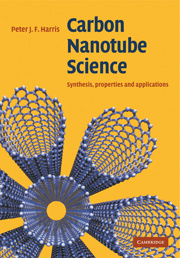Description
Carbon Nanotube Science (2nd Ed.)
Synthesis, Properties and Applications
Author: Harris Peter J. F.
Provides coverage of all of the important aspects of carbon nanotube research, including synthesis, properties and potential applications.
Language: English
Subject for Carbon Nanotube Science:
Approximative price 67.54 €
In Print (Delivery period: 14 days).
Add to cart
Carbon Nanotube Science
Publication date: 04-2011
Support: Print on demand
Publication date: 04-2011
Support: Print on demand
Approximative price 93.25 €
Subject to availability at the publisher.
Add to cart
Carbon nanotube science: synthesis, properties & applications (2nd Ed.)
Publication date: 03-2009
314 p. · 18x25.3 cm · Hardback
Publication date: 03-2009
314 p. · 18x25.3 cm · Hardback
Description
/li>Contents
/li>
Carbon nanotubes represent one of the most exciting research areas in modern science. These molecular-scale carbon tubes are the stiffest and strongest fibres known, with remarkable electronic properties, and potential applications in a wide range of fields. Carbon Nanotube Science is a concise, accessible book, presenting the basic knowledge that graduates and researchers need to know. Based on the successful Carbon Nanotubes and Related Structures, this book focuses solely on carbon nanotubes, covering the major advances made in recent years in this rapidly developing field. Chapters focus on electronic properties, chemical and bimolecular functionalisation, nanotube composites and nanotube-based probes and sensors. The book begins with a comprehensive discussion of synthesis, purification and processing methods. With its comprehensive coverage of this active research field, this book will appeal to researchers in a broad range of disciplines, including nanotechnology, engineering, materials science and physics.
1. Introduction; 2. Synthesis I: arc- and laser-vaporisation, heat treatment methods and electrolysis; 3. Synthesis II: catalytic chemical vapour deposition and related methods; 4. Purification and processing; 5. Structure; 6. Physical properties I: Electronic; 7. Physical properties II: Mechanical, optical and thermal; 8. Chemistry and biology of nanotubes; 9. Carbon nanotube composites; 10. Filled and heterogeneous nanotubes; 11. Probes and sensors; 12. Conclusions.
© 2024 LAVOISIER S.A.S.




